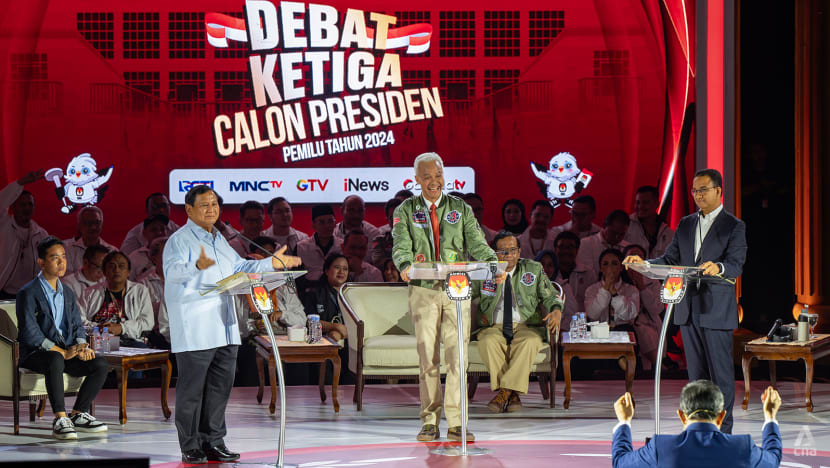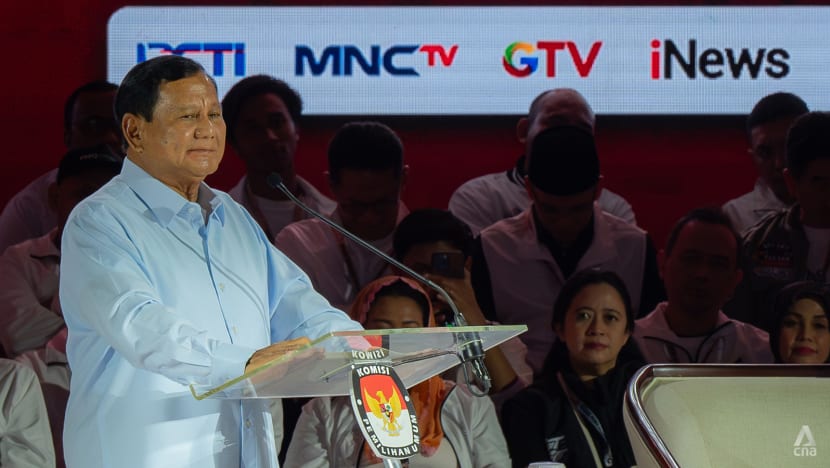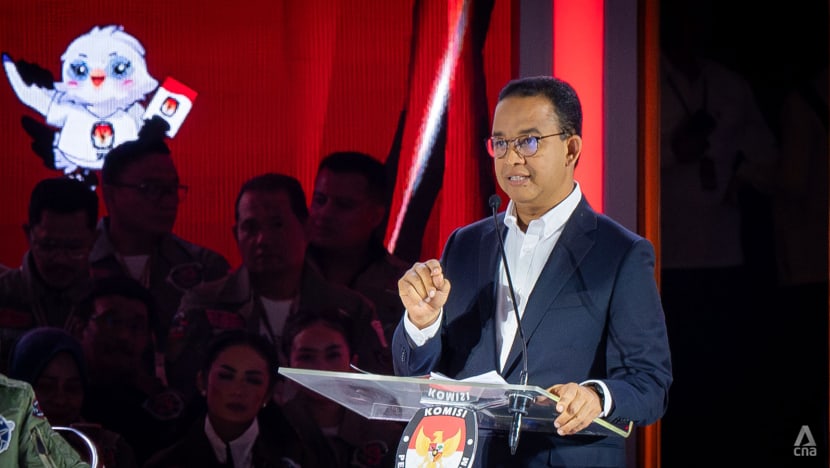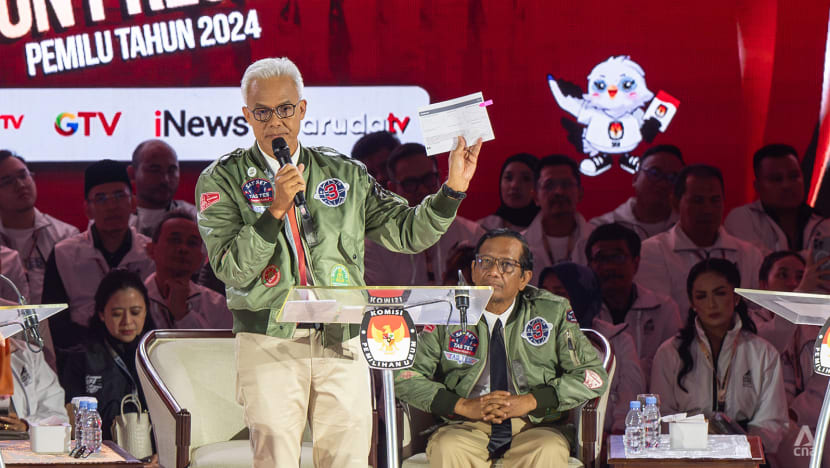Analysis: Are Indonesia’s presidential hopefuls Ganjar and Anies ganging up on frontrunner Prabowo and could it backfire?
Pollsters have put Defence Minister Prabowo Subianto as the strongest contender for Indonesia’s upcoming election on Feb 14, with an electability of more than 40 per cent.

The third Indonesian presidential candidate debate focused on defence, security, international relations and geopolitics. (Photo: CNA/Danang Wisanggeni)

This audio is generated by an AI tool.
JAKARTA: Indonesian presidential frontrunner Prabowo Subianto was jointly attacked by his two opponents again in another televised election debate, in a tag-team move that has appeared to lower the defence minister’s winning chances.
But analysts are split on whether the seemingly uncoordinated offensive by ex-Jakarta governor Anies Baswedan and former Central Java governor Ganjar Pranowo would pay off for them in shaving Mr Prabowo’s lead in time for the Feb 14 presidential election, or if it might even backfire.
In the third of a five-debate series, the candidates were grilled on Sunday night (Jan 7) on the topics of defence, security, international relations and geopolitics.
It’s familiar territory for Mr Prabowo, 72, who has been Indonesia’s defence minister for almost five years, though that did not stop his two rivals from criticising his performance at the ministry, such as accusing him of mismanaging defence procurement.
Mr Prabowo was notably upset and said at a press conference after the debate that his rivals were not citing accurate data.
“I was a little disappointed with the quality (of the debate), especially the narratives conveyed by the other candidates. In my opinion, first of all, their data is wrong,” said a visibly sullen-looking candidate.
"Secondly, (they want to) use the issues of defence to score political points, which, in my opinion, is not permissible for statesmen.”
Political analyst Ujang Komarudin from the University of Al Azhar Indonesia said Mr Prabowo is being attacked because he is the frontrunner.
“Those were hard and continuous attacks because Prabowo is considered a common enemy given his high electability.
"All surveys have put Prabowo on the first spot and far ahead of the electability of Anies and Ganjar. Therefore, to bring down Prabowo, he must be attacked during the debate.”
On Saturday, pollster Indikator Politik Indonesia, for example, released its latest survey. It shows that Mr Prabowo’s electability is 46.9 per cent.
Mr Anies came in second with 23.2 per cent, while Mr Ganjar secured the last spot with 22.2 per cent.
However, a survey by the daily newspaper Kompas after Sunday’s debate showed that 79.7 per cent of its 210 respondents nationwide were satisfied with Mr Ganjar's performance.
A total of 71.4 per cent were satisfied with Mr Anies’ performance, while only 48.9 per cent were satisfied with Mr Prabowo’s performance.

NOT THE FIRST ATTACK
During the first debate on Dec 12 which covered areas in law, human rights, eradication of corruption, governance, improving public service, strengthening democracy, tackling disinformation, and managing civic harmony, Mr Anies also focused his criticisms on Mr Prabowo while Mr Ganjar was more reserved.
The second debate was for the vice presidential candidates - Mr Muhaimin Iskandar, who is teaming up with Mr Anies; Mr Gibran Rakabuming Raka who is Mr Prabowo’s running mate; and Mr Mahfud MD who is the vice presidential candidate of Mr Ganjar.
The third debate was for the presidential candidates again, and Mr Anies and Mr Ganjar took aim at Mr Prabowo’s military procurement strategy as defence minister.
Mr Anies criticised Mr Prabowo, who is vying for the presidency for the third time in a row, for procuring billions of dollars for weaponry, while many Indonesian military personnel do not own a house.
He even went beyond by highlighting Mr Prabowo's personal wealth.
“While half of our soldiers do not have official residences, its minister owns 340,000 ha of land,” said Mr Anies, claiming to cite the data President Joko Widodo, popularly known as Jokowi, used during the 2019 presidential debate when the latter ran against Mr Prabowo.
The defence minister denied Mr Anies’ claim, but the latter continued his criticism of Mr Prabowo on another front.
During Mr Prabowo’s tenure, the government introduced a programme called food estate, which is coordinated by the defence ministry and aimed to establish large-scale agricultural plantations in several parts of Indonesia to ensure food security nationwide.
Depending on the location of the plantation, the crops were supposed to be rice, cassava and potato.

But Mr Anies claimed the defence ministry’s food estate is a failed project because cassavas can barely grow on the hundreds of hectares of land procured for the scheme.
Meanwhile, Mr Ganjar highlighted the defence ministry’s budget, saying it should account for at least 2 per cent of the gross domestic product.
However, he noted it only accounts for 0.7 per cent, and that Mr Prabowo should have pushed for a bigger budget that included soldiers’ welfare.
“Your planning is too reckless, and you are not serious about managing the domestic defence industry,” said Mr Ganjar. “I am doubtful about how you manage the defence budget in Indonesia.”
Both Mr Anies and Mr Ganjar also criticised Mr Prabowo’s move in the past few years, where he has bought used military equipment, claiming it was a waste of money.
However, Mr Prabowo said it is not an issue. “When it comes to military equipment, it is not about whether it’s not new or used. But it is about the age (of the equipment).”
For example, if it is a plane, it is the flying hours, he said. Mr Prabowo claimed the flying hours of the equipment he procured are still good.
At one point, Mr Anies and Mr Ganjar seemed even to be targeting Mr Prabowo jointly.
When it was Mr Anies’ turn to ask Mr Ganjar a question, he asked him how he would rate the performance of the defence ministry.
Mr Ganjar gave a five out of 10, which Mr Anies said is too good.
“It is 11 out of 100,” said Mr Anies, whose laughter prompted the audience to follow suit.
THE FRONTRUNNER IS THE COMMON ENEMY
Analysts CNA spoke to said the attacks by Mr Anies and Mr Ganjar will continue until the last debate involving the presidential candidates set to take place on Feb 4.
“I think this pattern (of attacking other candidates) will continue to be repeated to expose the rivals’ weaknesses as part of efforts to seek public support, especially swing voters,” said Mr Wasisto Rahajo Jati, a political expert with the Indonesian National Research and Innovation Agency (BRIN).
However, political analyst Ray Rangkuti from the Jakarta-based think tank Lingkar Madani told CNA that Mr Anies and Mr Ganjar were just taking advantage of the fact that Mr Prabowo is the current defence minister.
“Because Mr Prabowo’s argument so far has always been it is not necessary to talk much (to the public and media). What is important is to work, work, work,” said Mr Rangkuti.
“But when the two other candidates asked about his work, he couldn’t explain himself.”

While there is a pattern that Mr Prabowo is being attacked by the other two, Mr Wasisto from BRIN is doubtful about its effectiveness.
“I think it depends on the public perception because, basically, the attack is part of an effort to attract the public’s attention towards the capabilities and problem-solving abilities of each presidential candidate,” he told CNA.
Mr Ujang from the University of Al Azhar Indonesia thinks the attacks on Mr Prabowo have left the debate with no winner.
"Regarding the attacks, no one won the debate because the method was not elegant. An elegant way is a soft way, a good way, a way that is pleasant for people to hear and see,” he said, adding that the offensive against Mr Prabowo could even backfire for Mr Anies and Mr Ganjar.
Mr Ujang cited, for example, how Mr Ganjar’s electability according to opinion polls has decreased each time he and his party PDI-P criticise Mr Prabowo.
However, Mr Rangkuti from Lingkar Madani believes Mr Anies and Mr Ganjar should continue attacking Mr Prabowo if they want to win as it would show their stance.
“For Mr Anies, there is no other way because his stance is different (from Mr Prabowo’s). Therefore, he needs to show that. In comparison, Mr Ganjar’s stance is more moderate,” he said.
Mr Prabowo is campaigning to continue Jokowi’s programme, while Mr Anies wants a change. On the other hand, Mr Ganjar wants to continue what he believes are good programmes under Jokowi while introducing his own schemes.
Mr Rangkuti believed Mr Prabowo was probably also eager to counter-attack his opponents during the debate but did not have much material to do so since the former governors have never been involved in defence matters.
Citing the Kompas post-debate survey showing how Mr Prabowo was deemed to have fared poorest, Mr Rangkuti also thinks attacking the defence minister would not hurt Mr Anies and Mr Ganjar.
“The election debate can be very influential because, according to surveys, almost 30 per cent of potential voters are still undecided,” the analyst added.
Read this story in Bahasa Indonesia here.
















